Unit 11 How was your school trips 单元复习课件-七年级英语下册同步精品课堂(人教版)
文档属性
| 名称 | Unit 11 How was your school trips 单元复习课件-七年级英语下册同步精品课堂(人教版) |
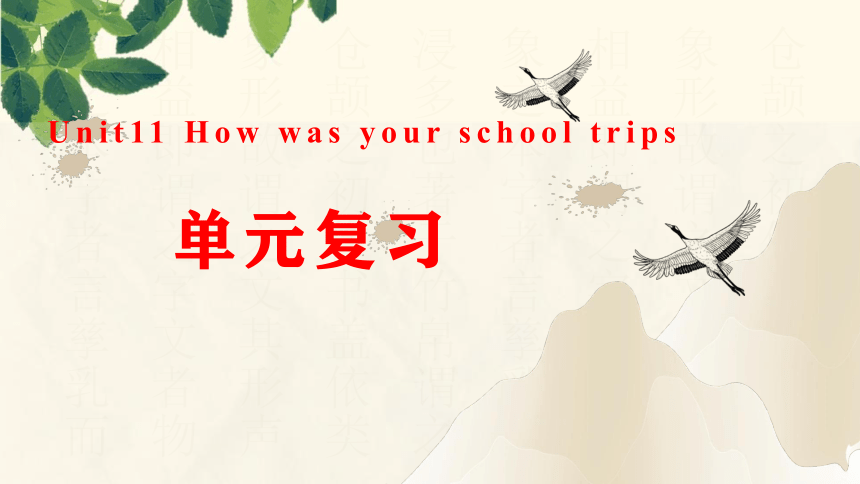
|
|
| 格式 | pptx | ||
| 文件大小 | 5.3MB | ||
| 资源类型 | 试卷 | ||
| 版本资源 | 人教新目标(Go for it)版 | ||
| 科目 | 英语 | ||
| 更新时间 | 2024-04-16 00:00:00 | ||
图片预览

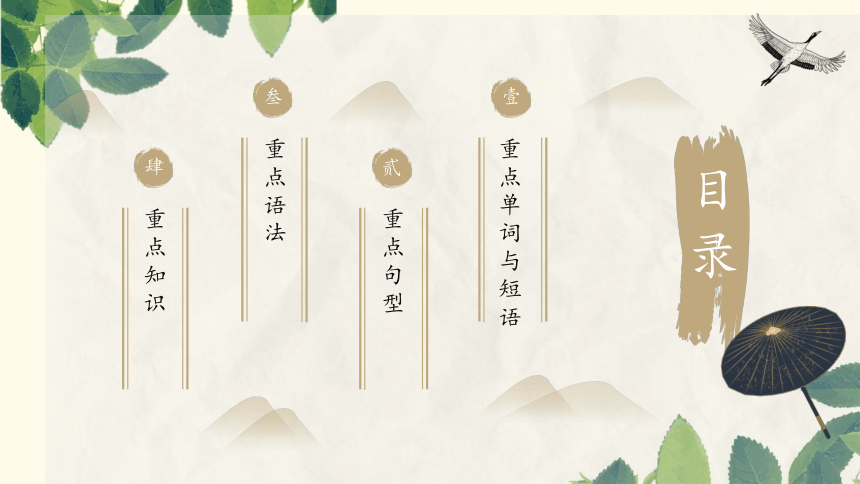
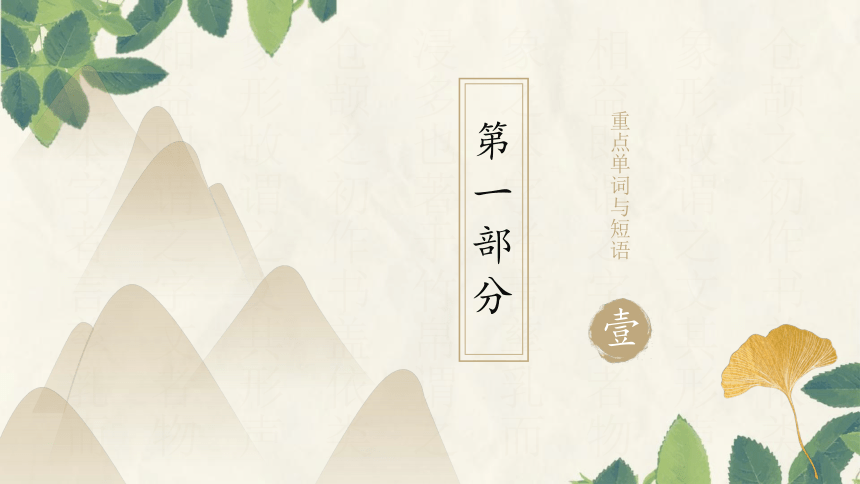
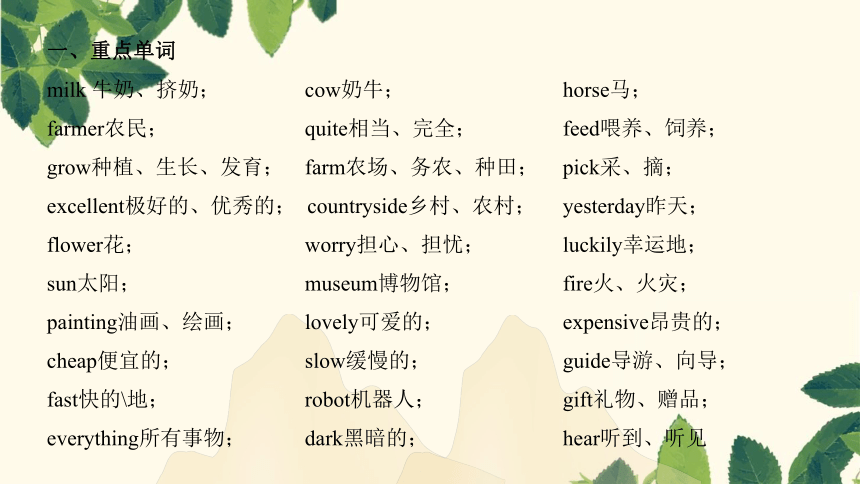
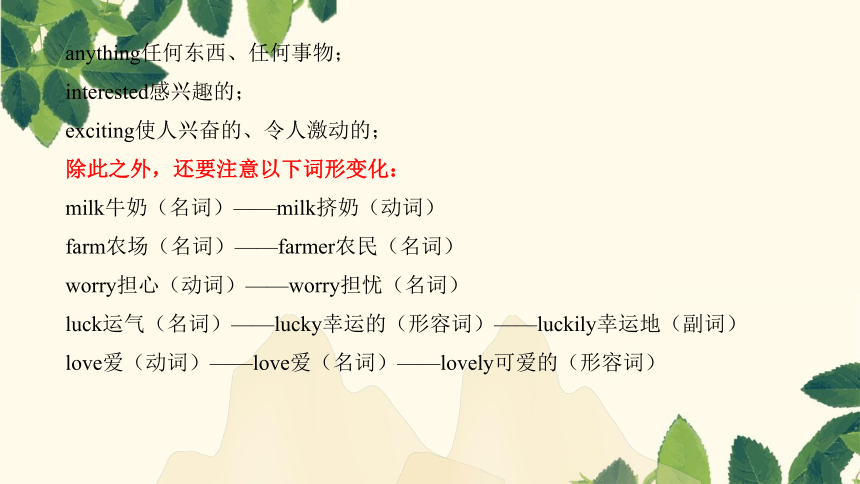
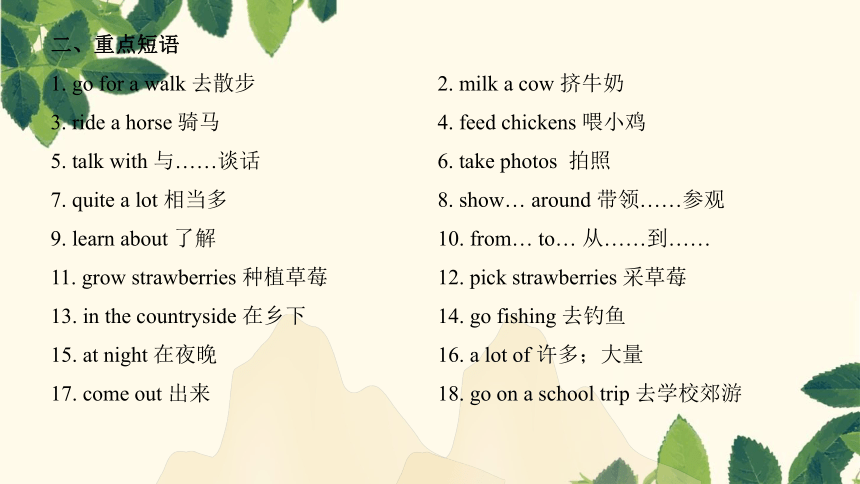
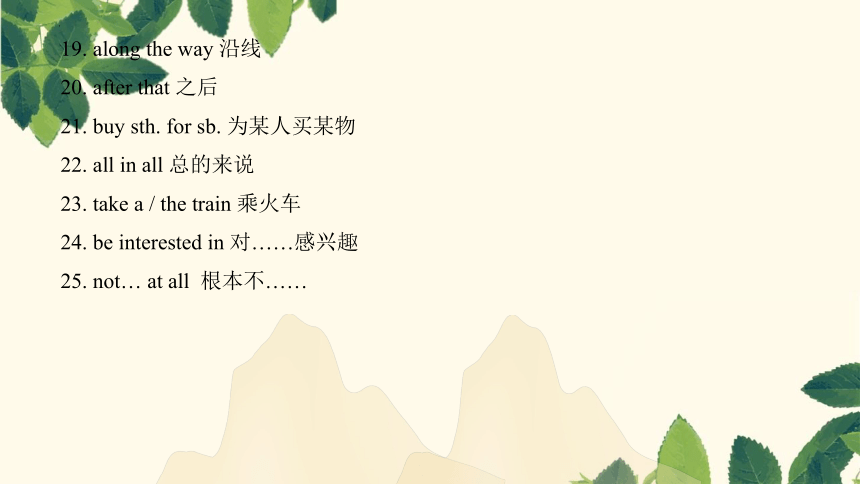
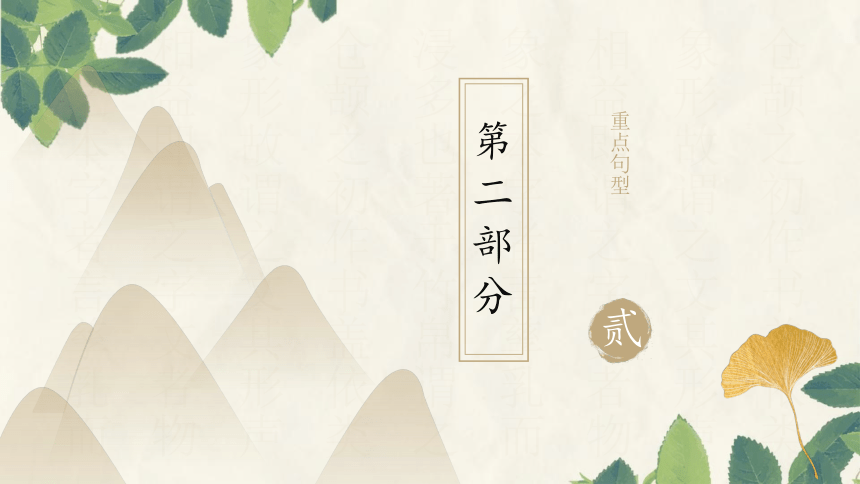
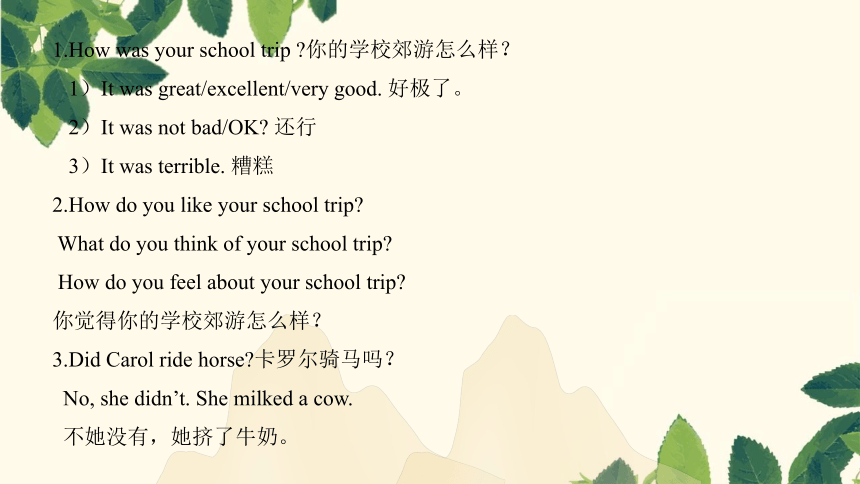
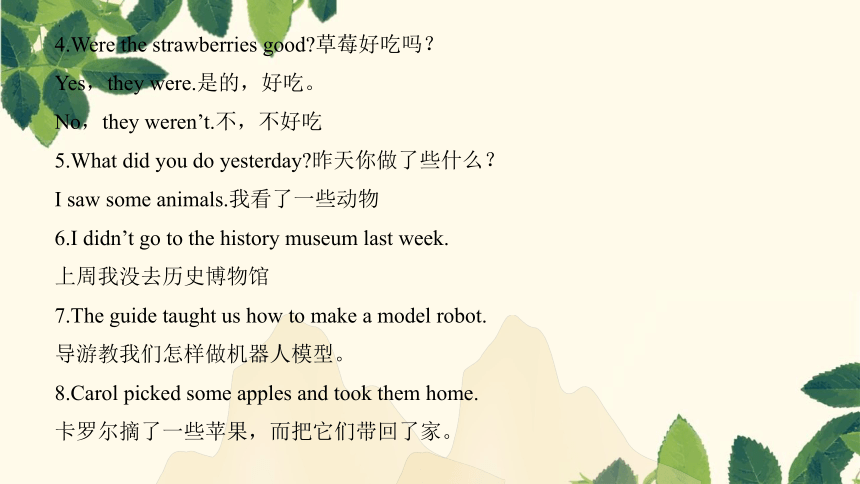
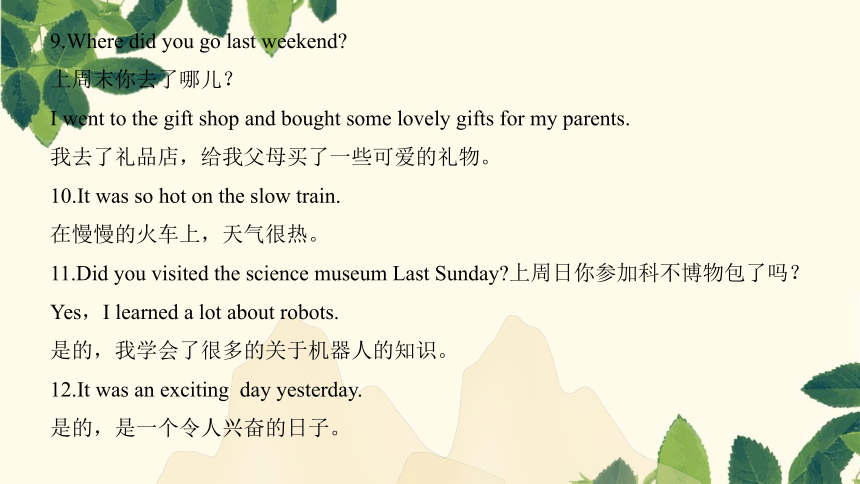
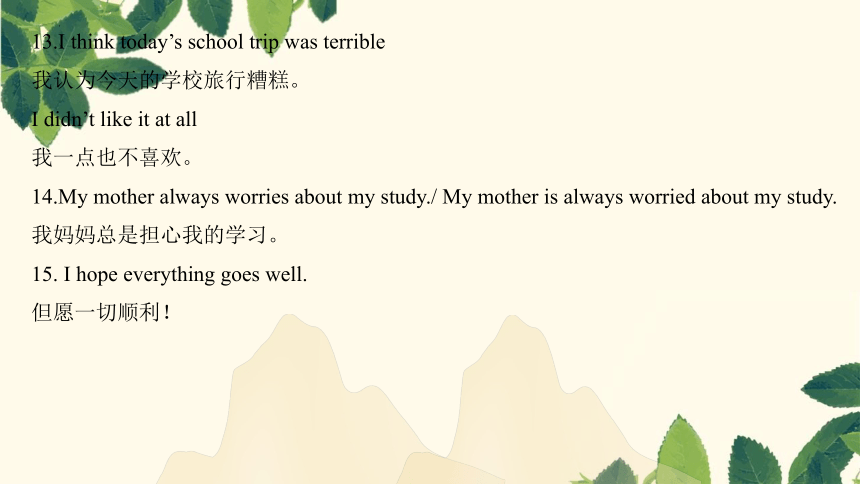
文档简介
(共65张PPT)
仓颉之初作书盖依类象形故谓之文其形声相益即谓之字文者物象之本字者言孳乳而浸多也著于竹帛谓之仓颉之初作书盖依类象形故谓之文其形声相益即谓之字文者物象之本字者言孳乳而
单元复习
Unit11 How was your school trips
重点单词与短语
壹
重点句型
贰
重点语法
叁
重点知识
肆
目录
仓颉之初作书盖依类象形故谓之文其形声相益即谓之字文者物象之本字者言孳乳而浸多也著于竹帛谓之仓颉之初作书盖依类象形故谓之文其形声相益即谓之字文者物象之本字者言孳乳而
重点单词与短语
第一部分
壹
一、重点单词
milk 牛奶、挤奶; cow奶牛; horse马;
farmer农民; quite相当、完全; feed喂养、饲养;
grow种植、生长、发育; farm农场、务农、种田; pick采、摘;
excellent极好的、优秀的; countryside乡村、农村; yesterday昨天;
flower花; worry担心、担忧; luckily幸运地;
sun太阳; museum博物馆; fire火、火灾;
painting油画、绘画; lovely可爱的; expensive昂贵的;
cheap便宜的; slow缓慢的; guide导游、向导;
fast快的\地; robot机器人; gift礼物、赠品;everything所有事物; dark黑暗的; hear听到、听见
anything任何东西、任何事物;
interested感兴趣的;
exciting使人兴奋的、令人激动的;
除此之外,还要注意以下词形变化:
milk牛奶(名词)——milk挤奶(动词)
farm农场(名词)——farmer农民(名词)
worry担心(动词)——worry担忧(名词)
luck运气(名词)——lucky幸运的(形容词)——luckily幸运地(副词)
love爱(动词)——love爱(名词)——lovely可爱的(形容词)
二、重点短语
1. go for a walk 去散步 2. milk a cow 挤牛奶
3. ride a horse 骑马 4. feed chickens 喂小鸡
5. talk with 与……谈话 6. take photos 拍照
7. quite a lot 相当多 8. show… around 带领……参观
9. learn about 了解 10. from… to… 从……到……
11. grow strawberries 种植草莓 12. pick strawberries 采草莓
13. in the countryside 在乡下 14. go fishing 去钓鱼
15. at night 在夜晚 16. a lot of 许多;大量
e out 出来 18. go on a school trip 去学校郊游
19. along the way 沿线
20. after that 之后
21. buy sth. for sb. 为某人买某物
22. all in all 总的来说
23. take a / the train 乘火车
24. be interested in 对……感兴趣
25. not… at all 根本不……
仓颉之初作书盖依类象形故谓之文其形声相益即谓之字文者物象之本字者言孳乳而浸多也著于竹帛谓之仓颉之初作书盖依类象形故谓之文其形声相益即谓之字文者物象之本字者言孳乳而
重点句型
第二部分
贰
1.How was your school trip 你的学校郊游怎么样?
1)It was great/excellent/very good. 好极了。
2)It was not bad/OK 还行
3)It was terrible. 糟糕
2.How do you like your school trip
What do you think of your school trip
How do you feel about your school trip
你觉得你的学校郊游怎么样?
3.Did Carol ride horse 卡罗尔骑马吗?
No, she didn’t. She milked a cow.
不她没有,她挤了牛奶。
4.Were the strawberries good 草莓好吃吗?
Yes,they were.是的,好吃。
No,they weren’t.不,不好吃
5.What did you do yesterday 昨天你做了些什么?
I saw some animals.我看了一些动物
6.I didn’t go to the history museum last week.
上周我没去历史博物馆
7.The guide taught us how to make a model robot.
导游教我们怎样做机器人模型。
8.Carol picked some apples and took them home.
卡罗尔摘了一些苹果,而把它们带回了家。
9.Where did you go last weekend
上周末你去了哪儿?
I went to the gift shop and bought some lovely gifts for my parents.
我去了礼品店,给我父母买了一些可爱的礼物。
10.It was so hot on the slow train.
在慢慢的火车上,天气很热。
11.Did you visited the science museum Last Sunday 上周日你参加科不博物包了吗?
Yes,I learned a lot about robots.
是的,我学会了很多的关于机器人的知识。
12.It was an exciting day yesterday.
是的,是一个令人兴奋的日子。
13.I think today’s school trip was terrible
我认为今天的学校旅行糟糕。
I didn’t like it at all
我一点也不喜欢。
14.My mother always worries about my study./ My mother is always worried about my study.
我妈妈总是担心我的学习。
15. I hope everything goes well.
但愿一切顺利!
仓颉之初作书盖依类象形故谓之文其形声相益即谓之字文者物象之本字者言孳乳而浸多也著于竹帛谓之仓颉之初作书盖依类象形故谓之文其形声相益即谓之字文者物象之本字者言孳乳而
重点语法
第三部分
叄
【定义】一般过去时表示过去某个时间发生的动作或存在的状态,常和表示过去的时间状语连用。如 yesterday, last night, last week, two days ago(两天前), in 2008 等。
一般过去时
① I did my homework last night. 我昨晚做了作业。
② He went to school by bike yesterday.
昨天他骑自行车去上学。
③ Tom played baskeatball with his friends last weekend.
汤姆上周末和朋友们打了篮球。
一般过去时也表示过去经常或反复发生的动作,常和often,always等表示频度的时间状语连用。
① He always went to work by bus last year.
去年他总是坐公共汽车去上班。
② When I was a child, I often played basketball with my friends.
当我还是个孩子时,我经常和朋友一起打篮球。
一般过去式的构成
(1) 含be动词的一般过去时的句式结构
①肯定句:主语+was/were+其他。
His brother was 12 years old last year. 他的哥哥去年12岁。
②否定句:主语+was/were + not +其他。
His brother wasn't 12 years old last year. 他的哥哥去年不是12岁。
③一般疑问句:Was/Were+主语十其他?
-Was his brother 12 years old last year 他的哥哥去年12岁吗
-Yes, he was. /No, he wasn't. 是的,他是。/不,他不是。
④特殊疑问句:疑问词 十 was/were + 其他
How was your school trip 你的学校旅行怎么样?
③一般疑问句:Did + 主语 + 动词原形 + 其他?
-Did Tom go to the park yesterday 汤姆昨天去公园了吗?
-Yes, he did. /No,he didn't. 是的,他去了。/不,他没去。
一般过去式的构成
(2)含实义动词的一般过去时的句式结构
①肯定句:主语 + 动词的过去式 + 其他。
Tom went to the park yesterday. 汤姆昨天去了公园。
②否定句:主语+didn't + 动词原形 + 其他。
Tom didn't go to the park yesterday. 汤姆昨天没有去公园。
④特殊疑问句:疑问词+did + 主语 + 动词原形 + 其他?
-Where did Tom go yesterday 汤姆昨天去了哪里?
-He went to the park. 他去了公园。
watch—watched look— looked clean—cleaned play—played
Look at the past forms of the verbs. Summarize the rules.
一般情况下,动词词尾加 ed
waste—wasted dance—danced
disagree —disagreed
Look at the past forms of the verbs. Summarize the rules.
以不发音的 e 结尾动词,动词词尾加 d
worry—worried
carry—carried
study—studied
Look at the past forms of the verbs. Summarize the rules.
以辅音字母 + y结尾的动词,把y变为i 再加ed
stop—stopped
drop—dropped
Look at the past forms of the verbs. Summarize the rules.
以一个辅音字母结尾的重读闭音节动词,双写词尾辅音字母,再加 ed
动词的过去式是在动词原形的基础上变化的。动词的过去式可分为规则动词和不规则动词。
规则动词的过去式变化如下:
(1)一般情况下,动词词尾加 ed ,如:
worked played wanted acted
(2)以不发音的 e 结尾动词,动词词尾加 d,如:
lived moved decided declined hoped
judged raised wiped
我的发现
(3)以辅音字母 + y结尾的动词,把y变为i 再加ed,如:
studied tried copied cried carried emptied
(4)以一个辅音字母结尾的重读闭音节动词,双写词尾辅音字
母,再加 ed,如:
stopped begged fretted dragged dropped
planned dotted
我的发现
不规则动词的过去式变化规律性不强,须多加记忆:
go - went,make - made,get - got ,buy - bought ,come - came ,
fly-flew ,is/am-was,are-were ,see-saw ,bring-brought,
do-did,teach-taught, think-thought, say-said,sit-sat,put-put,
grow-grew,take-took,catch-caught,become-became,
swim-swam,sweep—swept,sing—sang,draw—drew
我的发现
仓颉之初作书盖依类象形故谓之文其形声相益即谓之字文者物象之本字者言孳乳而浸多也著于竹帛谓之仓颉之初作书盖依类象形故谓之文其形声相益即谓之字文者物象之本字者言孳乳而
重点知识
第四部分
肆
1. Did you see any cows Yes, I did. I saw quite a lot.
quiet a lot + of + 可数或不可数, 也可以单独使用。
quite a little “相当多, 不少” + 不可数名词
quite a few “相当多, 不少” + 可数名词
We drank quite a lot of wine.我们喝了不少酒。
I saw quite a lot of cows.
我看到了相当多的奶牛。
I play tennis quite a lot in the summer.
夏天我经常打网球。
Quite a few students were late.
不少学生迟到了。
【辨析】quite 和 very
quite 程度副词,可修饰动词、副词、形容词
结构:quite+a / an+形容词+名词
very程度副词,语气较quite重。可修饰副词、形容词,但不可直接修饰动词。
结构:a+very+形容词+名词
判断下列句中quite和very分别修饰的什么词性?
It’s quite / very important to stop school bullying.阻止校园欺凌很重要。
My brother thinks Wang Feng sings quite / very well.我哥哥认为汪峰唱得非常好。
She quite likes swimming. 她非常喜欢游泳。
Tom is a very good boy.
=Tom is quite a good boy. 汤姆是个很好的男孩。
【易错点】
形近的词:
quite /kwa t/ adv. 很,相当
quiet / kwa t/ adj. 安静的
quit /kw t/ v. 放弃;离职
一语辨异:
The quiet girl quits quite a good job.
这个安静的女孩辞掉了一份相当好的工作。
2. milk v. 挤奶 n[U]. 牛奶
作及物动词,意为“挤…的奶”;
作不及物动词意为“挤奶”。
I milk the cow to have some milk to drink.
我挤些牛奶来喝。
和“牛”有关的英语词汇:
milk(牛奶)
beef(牛肉)
cow(母牛;奶牛)
ox(公牛)
3. fed chickens 喂了小鸡
feed v. 喂养;饲养
fed 为feed 的过去式,后面常接表示动物的名词作宾语。
feed sth. to sb./sth. 把……喂给……
feed sb./sth. on sth. 用……喂养……
feed on 以……为食
I sometimes feed nuts to the monkey.
我有时候把坚果喂给这只猴子。
Can I feed the cat on meat
我能用肉喂这只猫吗?
Horses feed on grass. 马以草为食。
4. The farmer showed Carol around the farm.
show sb. around sth. 带领某人参观……
show作及物动词:
①意为“给…看;出示;显示”,常构成show sb. sth. 或show sth. to sb. 结构。
Please show me that photo. =Please show that photo to me. 请把那张照片拿给我看看。
②意为“(向人)说明;表明;指示;放映;展出”。
Your homework shows that you are very careful. 从你的作业上可以看出你很认真。
show sb. sth. = show sth. to sb. 将某物给某人看
show up 出现,露面
show off 炫耀
Please show me your passport. 请把你的驾照给我看看。
A strange man showe up at the end of the party.在聚会的最后,一个奇怪的男人出现了。
5. Carol learned a lot about farming.
1)learn about… 学习/ 了解关于……
learn about 了解/知道/获悉,相当于know about。
I’d like to learn more about computers.我想学习更多关于电脑的知识。
How did you learn / know about the meeting 你是怎么知道会议的情况的?
2)farm
n. 农场 on the farm 在农场上
v. 耕种;干农活 It is still too cold for farming. 天气还是太冷,不适合农耕。
【拓展】
farmingn. 农事;耕作 He is farming there.他正在那儿干农活。
farmer n. 农民;农场主 The farmer is farming on a farm.这位农民正在农场干活。
6. How was your trip last week 本句为询问某事情况的常用句型。
1)How + be… 意为“……怎么样?”可与“What be … like ”互换。
How was your summer vacation = What was your summer vacation like
你的暑假过得怎样?
常用答语:It was great. 好极了。It was OK. 还可以。
It wasn’t good. 不好。It was not bad. 还不错。
2)trip名词,意为“郊游;旅行”,通常指近距离、某次具体的旅行。
Have a good trip! 旅途愉快!
【拓展】你认为...怎么样?
What do you think of ... =How is ... =What is ... like
今天天气怎么样?How is the weather today /What is the weather like today
昨天天气怎么样?How was the weather yesterday /What was the weather like yesterday
7. It was excellent.
excellent “极好的;优秀的”,相当于very good。通常用于肯定句,不用于否定句或疑问句。
The food is excellent here. 这里的食物很好。
be excellent in 在...方面极好
He is excellent in math. 他的数学非常好。
5. It was great, and the air was so clean.
clean 形容词,意为“干净的;清洁的”。反义词:dirty 脏的
clean 作动词,意为“打扫;把……弄干净”。
常用短语:
clean out 把...打扫干净 clean up 收拾干净;清理
8.Did you learn anything anything pron. 任何事情
①(在否定或疑问句中或if条件句中) 代替something
Do you know anything about COVID-19
If you remember anything, please let me know.
②(肯定句中) 随便哪个东西;随便什么事物
I want something to drink and anything is OK.
Anything is possible.
【拓展】
①形容词修饰anything放在其后:anything + adj. Did you hear anything interesting
②在表请求、建议等希望得到肯定回答的疑问句中不用anything,而要用something。
Would you like something to eat
③anything 作主语视作单数 Anything in the room is his.
9.Did you grow any apples
grow此处用作及物动词,意为“种植;栽培”,其后可直接接名词或代词作宾语。
We grow flowers and vegetables in our garden.我们在花园里种植鲜花和蔬菜。
【拓展】
(1)grow可用作不及物动词,意为“生长;发育”。
In spring, everything begins to grow.春天万物复苏。
How quickly the baby is growing!这个婴儿长得多么快啊!
(2)grow可用作连系动词,有“逐渐变得”之意,强调变化过程。
It's growing dark.天渐渐(变)黑了。
(3)grow up意为“长大;成长”。
What do you want to be when you grow up 你长大后想当什么?
10.Carol picked some strawberries and took them home.
pick v. ① 采,摘;② 挑选;③ 剔除
Don’t pick flowers in the garden. 不要摘花园里的花。
Pick out a number from one to five. 从1到5选出个数字。
He picks the nuts from the cake. 他从蛋糕里挑出坚果。
pick apples / flowers 摘苹果、摘花
pick one’s nose 抠鼻子
pick one’s teeth 剔牙齿
pick out ①挑选出来 ②辨认出…
pick up ①捡起 ②接电话
③(开车)接某人 ④学会… ⑤感染(疾病)
11.It was so much fun.
1)so much意为“如此多;这么多”,一般用于修饰不可数名词或动词。
There was so much noise in the classroom.教室里太吵了。
【拓展】so many “这么多;如此多”,常用来修饰可数名词复数。
He had so many friends in the city.在这个城市里,他有这么多朋友。
2)fun此处用作不可数名词,意为“乐趣;开心;有趣的人或事”,其前常用great,much,a lot of等修饰,用来加强语气。
He's great fun, and his dog is great fun, too. 他是个有趣的人,他的狗也很有趣。
Skating is great fun. 滑冰是件很有趣的事。
【拓展】have (great) fun 玩得开心
have great fun doing sth. 做某事玩得开心
Look, Peter. The children are having so much fun. 看,皮特,孩子们玩的多开心。
12.I visited my grandparents in the countryside.
我去看望了乡下的爷爷奶奶。
a) visit 表示“拜访,看望,参观”,后面宾语可以是人,也可以是地点名词。
visit my teacher = call on my teacher
visit your school = call at your school
b) in the countryside 在乡下
countryside在此处等同于country,都是“乡下,农村”之意,往往和冠词 “the” 搭配连用。
We spent a pleasant day in the country.
我们在乡下度过了愉快的一天。
13.Luckily, it didn’t, and the sun came out again.幸运地,没有下雨,太阳又出来了。
1)luckily副词,意为“幸运地;好运地”。通常放在句首,用来修饰整个句子。
Luckily, we got there on time.
幸运地,我们准时到达了那里。
【拓展】
①luck名词,意为“运气”。
What good luck !
多么幸运啊!
②lucky形容词,意为“幸运的”。
You are a lucky dog.
你真是一个幸运儿。
2)sun名词,意为“太阳”,为世界上独一无二的事物,其前通常要加定冠词the,类似的名词还有moon“月亮”,earth“地球”等。
The sun rises in the east and sets in the west.
太阳从东方升起,在西方落下。
【拓展】
sunny形容词,意为“晴朗的”。
It's sunny today.
今天天气晴朗。
It was a sunny day yesterday.
昨天是一个晴天。
3)come out意为“出来”,其中out为副词。
The sun is coming out.太阳就要出来了。
【拓展】come out的其他含义:
①(花)开放
The flowers begin to come out.花儿开始开放。
②出版;发表
His first book came out in 2003.
他的第一本书于2003年出版了。
③透露,传出
The truth came out at last.
终于真相大白了。
14. But at about two o’clock, it got very cloudy and we worried it would rain.
但是,在大约两点钟, 天变得阴云密布,我们担心会下雨。
【句式剖析】
But at about two o’clock,
时间状语 省略了that的宾语从句
it got very cloudy and we worried it would rain.
and连接两个并列分句
worry此处用作及物动词,意为“担心;担忧”,后面常接宾语从句。
The teacher worried that these problems might be too hard for her students.
这位老师担心这些问题可能对她的学生来说太难。
【拓展】
1)worry用作及物动词,还可意为“使担心,使发愁”,常接sb. 作宾语。
Nothing worries me.我没有什么可担心的。
The boy worried his mother.这个男孩让他妈妈担心。
2)worry还可用作不及物动词,意为“忧虑,担心”,后接宾语时,常加about。
Tell them not to worry.告诉他们不要担心。
Don't worry about John. He'll be back soon.
不必为约翰担忧,他马上就回来。
3)worried形容词,意为“担心的;焦虑的”,常用短语:be worried about意为“担心……”,与worry about 同义。
I'm really worried about my sister.我真的很担心我妹妹。
15. visit a fire station 参观消防站
fire n.火;火灾
fire意为“火”时,作不可数名词;意为“火灾”时,作可数名词和不可数名词均可。
常见短语有:on fire着火;catch fire着火;put out a fire灭火;make a fire生火。
The whole building is on fire.
整个大楼着火了。
Dry leaves are easy to catch fire.
干树叶很容易着火。
Those young firemen were brave enough to put out the fire in the forest.
那些年轻的消防队员们足够勇敢,扑灭了森林火灾。
Let's make a fire. 让我们生火吧。
【拓展】
1) fire作名词,还有“炉火;灶火”的含义。make/build a fire“生火”。
You put up the tent, and I’ll make a fire.
你搭帐篷,我来生火。
2) fire还可作动词,意为“开枪,开火;开除”。
The officer ordered his men to fire.
军官命令士兵射击。
We had to fire him for dishonesty.
他不诚实,我们不得不开除他
16.see some paintings
painting为可数名词,意为“油画;绘画”,其动词形式为paint,意为“绘画;给……上油漆”。
Mona Lisa is a great painting. 《蒙娜丽莎》是一幅伟大的画作。
The boy is painting a tiger. 这个男孩正在画一只老虎。
【拓展】
1)paint动词,意为“绘画;给……上油漆”。
My elder sister is learning to paint in a school.我姐姐正在一所学校里学绘画。
He painted the wall red.他把墙涂成了红色。
2)painter名词,意为“画家;油漆工”。
He is a famous painter.他是一位著名的画家。
17. expensive昂贵的
expensive形容词,意为“昂贵的”。
This is an expensive hat.这是一顶昂贵的帽子。
【注意】说价格高或低要用形容词high或low,而不能用expensive或cheap; 一般商品作主语时才用expensive 或cheap。
The price of this bag is high.
这个包的价格很高。
This bag is very expensive.这个包很贵。
18. Today went on a school trip.今天我参加学校旅行了。
go on a school trip意为”参加学校旅行”,是"go on a/an+名词”结构,意为”进行...
We went on school trip last week.
上周我们参加了学校旅行。
go on picnic去野餐
go on vacation去度假
19. Then the guide taught us how to make a model robot.
然后,导游教我们怎样制作一个机器人模型。
taught为teach的过去式,teach 此处作及物动词,后接“疑问词+动词不定式"。
Let me teach you how to use the computer.
让我教你怎样使用电脑。
20. All in all, it was an exciting day.
1)all in all 总的来说;总之;整体上说
常用于句首,用来对所阐述的内容进行概括性总结及归纳。
All in all,you do well. 总的来说,你表现不错。
【拓展】
1) above all 意为首先;尤其是
Above all, he loves his work.
2) at all 意为全然,根本,用于否定句、条件句、疑问句等的句末。
It wasn't difficult to do at all.
3) after all 意为毕竟;居然;终究
After all, 15-minute exercise is better than nothing.
2)exciting adj. 使人兴奋的;令人激动的
【易混辨析】exciting与excited
exciting “使人兴奋的;令人激动的”,常用于修饰物,表示事物本身让人兴奋、激动。作定语和表语。作表语时,主语通常为物,强调事物所拥有的特征
The news is exciting.
excited “感到兴奋的”,常用于修饰人,表示人的主观感受。常作表语,主语通常是人,强调人的情绪
I am excited about the school trip.
I am excited to visit my cousin in Canada.
be excited about / at sth. 对某事感到兴奋
be excited to do sth. 感到兴奋去做某事
类似exciting与excited的词还有:
interesting 有趣的 interested 感兴趣的
relaxing 轻松的,放松的 relaxed 感到放松的
surprising 令人吃惊的 surprised 惊讶的
boring 令人厌倦的 bored 厌倦的
tiring 令人困倦的 tired 疲倦的
21. Then the guide taught us how to make a model robot.
然后,导游教我们怎样制作机器人模型。
1)【句式剖析】本句中how to make a model robot为“特殊疑问词 + 动词不定式”结构,在句中看作一个整体,作taught的直接宾语。
Then the guide taught us (how to make a model robot).
teach sb. sth.结构
2)guide n.导游;向导
The guide explained the history of the Great Wall to us.
导游向我们讲解了长城的历史。
【拓展】
1)guide作名词,还可表示“指南;指导手册;旅游指南”。
Follow our step-by-step guide.
跟着我们的分步指南去做。
2)guide还可作动词,意为“给某人领路;指引”。
He will guide you to the top of the mountain.
他将带领你们登上山顶。
The guide with a guide is guiding us through the forest.
那个拿着旅游指南的导游正领着我们穿越森林。
22. Everything was about robots and I’m not interested in that. 一切
都是关于机器人的,我对那方面不感兴趣。
1)everything pron. 所有事物;一切
everything是不定代词,作主语时,谓语动词用第三人称单数形式。
Everything goes well. 一切进展顺利。
It’s very important to make a plan before we do everything.
我们在做所有事情之前先制订一个计划是非常重要的。
2)be interested in 对……感兴趣
该结构中in为介词,其后接名词、代词或动词-ing形式作宾语。
He is interested in basketball. 他对篮球感兴趣。
Lisa is interested in singing and dancing. 莉萨对唱歌和跳舞感兴趣。
【拓展】interest作名词,意为“兴趣;关注”
Sth. is interesting. 某事很有趣。
take (an) interest in sth. 表示“对……有兴趣”。
have/show (an) interest in sth. 表示“ 对......有兴趣”。
I have an interest in film music. 我对电影音乐感兴趣。
【易混辨析】 interesting与interested
interesting 意为"有趣的",表示事物的性质特征。
This is an interesting story. 这是一个有趣的故事。
interested 意为"感兴趣的",表示人的主观感受。
He is interested in music.
他对音乐感兴趣。
23. There were also too many people and I couldn’t really see or hear the guide.
而且人太多,我真的看不见导游,也听不清导游说什么。
hear v. 听到;听见
【易混辨析】hear与listen
hear 及物动词 强调听的结果,其后直接接宾语。
I listened carefully, but heard nothing.
我仔细听了,但什么也没有听到。
listen 不及物动词 强调听的动作,其后跟宾语时要加介词to。
Boys and girls, please listen to me.
同学们,请听我说。
24. I didn’t like the trip at all. 我一点儿都不喜欢这次旅行。
not…at all 一点儿也不
not…at all表示强烈的否定意味。
Tom doesn’t like dancing at all. 汤姆一点儿也不喜欢跳舞。
【拓展延伸】not at all的用法:
1) 用来回答别人对你的感谢,意为“不客气,不用谢”。
—Thank you very much for lending me your bike. 非常感谢你借给我自行车。
—Not at all. 不客气。
2) 用来回答别人的歉意,意为“没关系”。
—I’m sorry, Mom. I broke the glass. 对不起,妈妈。我打破了玻璃杯。
—Not at all. Be careful next time. 没关系。下次小心。
25. I think today's school trip was terrible.
有些表示时间、距离、星球、世界、国家等无生命的东西的名词后加's来表示所有关系,叫做名词所有格。但如果名词以-s或-es结尾,则只在该名词后加' 来构成所有格。
① A ten miles' distance is far for me.
② The young man had a three hours' walk.
③ Beijing's streets are really busy.
1. Her uncle's office is about fifteen __________ (分钟)drive away from his home.
2. After two ______ (hour) walk, I'm so weak that I can't walk any further.
3. 在辛苦工作一周之后,我想通过音乐剧《猫》放松一下我自己。
_______________________, I want to relax myself by watching the musical Cats.
minutes'
hours'
After a week's hard work
26. At the zoo,I saw a lot of animals and I took some photos.
在动物园,我看到了很多动物并且照了很多照片。
1) a lot of=lots of,意为“很多”,既可以修饰不可数名词也可以修饰可数名词的复数形式,可以相应地换为much和many。
2)本句是由两个分句构成的并列句, and是并列连词, 表示并列关系。and还可用来连接单词、短语, 表示并列、顺承。
【拓展】
并列连词but意为“但是;而是;然而”, 表示转折关系, 所连接的成分意思相反或相对。
I also went to the gift shop with my classmates,but I didn't buy anything.
我还和同学们去了礼品店, 但我没买任何东西。
27、everything, something, anything, nothing区别
everything 意为“所有事物; 一切”
something 意为 “某事,某物”,通常用于肯定句,也可用于征求对方意见的疑问句中
anything 意为“任何东西;任何事物”,通常用于否定句或疑问句中
nothing 意为“没有什么”,本身是否定词,相当于not.....anything
28、dark此处为形容词,意为“黑暗的;昏暗的”。其反义词为bright,意为“光明的”。
It's getting dark.天快黑了。
①dark用作形容词,还表示“深色的",反义词为light,意为“(颜色)浅的”。
My daughter likes the dark. 我女儿喜欢深绿色
②dark还可用作名词,意为“黑暗;暗处”。
I could see nothing in the dark.在黑暗中我什么也看不清。
29、not at all的用法
①当别人向你表示感谢时,你可以回答not at all“不用谢,不客气”。
—Thank you very much for helping us.
非常感谢你帮助我们。
— Not at all.
不用谢。
② 别人向你致歉时,你可以回答not at all“没关系”。
—I'm sorry I'm late.
对不起,我迟到了。
30、bring的用法
1)bring作动词用,意为“带来”,其过去式为brought
常构成短语:bring sb. sth. = bring sth. to sb. 意为“给某人带来某物”
bring up 意为“养育”。
2)bring, take, carry与get的用法辨析:
bring表示从别处把某人或物“带来”或“拿来”
take指把某人或物“带走”或“拿走”(到别处)
carry指“搬运”,不具体说明来去的方向,有时含有沉重或麻烦之意
get 指到别处把某物取来, 相当于 go and bring
31、smile
(1)smile作动词用,常构成短语:smile at, 意为“对……微笑”;
(2)smile作名词用,常构成短语:with a smile on one’s face, 意为“某人面带微笑”;
(3)smile和laugh的区别:
smile一般是无声的微笑
laugh一般是有声的笑、大笑,laugh at 是嘲笑。
32、It’s + 形容词 + to do sth. 句型
1)在英语中,如果作主语的动词不定式太长,为了避免头重脚轻,一般用it作形式主语,而将真正的主语置于句尾。
2)It is+形容词+of sb. + to do sth.形容词描述行为者的性格品质如kind, nice, polite等.
It is+形容词+for sb. + to do sth. 形容词描述事物的特征、性质
It’s kind of you to help me. 帮助我,你是善良的
仓颉之初作书盖依类象形故谓之文其形声相益即谓之字文者物象之本字者言孳乳而浸多也著于竹帛谓之仓颉之初作书盖依类象形故谓之文其形声相益即谓之字文者物象之本字者言孳乳而
谢君一赏
仓颉之初作书盖依类象形故谓之文其形声相益即谓之字文者物象之本字者言孳乳而浸多也著于竹帛谓之仓颉之初作书盖依类象形故谓之文其形声相益即谓之字文者物象之本字者言孳乳而
单元复习
Unit11 How was your school trips
重点单词与短语
壹
重点句型
贰
重点语法
叁
重点知识
肆
目录
仓颉之初作书盖依类象形故谓之文其形声相益即谓之字文者物象之本字者言孳乳而浸多也著于竹帛谓之仓颉之初作书盖依类象形故谓之文其形声相益即谓之字文者物象之本字者言孳乳而
重点单词与短语
第一部分
壹
一、重点单词
milk 牛奶、挤奶; cow奶牛; horse马;
farmer农民; quite相当、完全; feed喂养、饲养;
grow种植、生长、发育; farm农场、务农、种田; pick采、摘;
excellent极好的、优秀的; countryside乡村、农村; yesterday昨天;
flower花; worry担心、担忧; luckily幸运地;
sun太阳; museum博物馆; fire火、火灾;
painting油画、绘画; lovely可爱的; expensive昂贵的;
cheap便宜的; slow缓慢的; guide导游、向导;
fast快的\地; robot机器人; gift礼物、赠品;everything所有事物; dark黑暗的; hear听到、听见
anything任何东西、任何事物;
interested感兴趣的;
exciting使人兴奋的、令人激动的;
除此之外,还要注意以下词形变化:
milk牛奶(名词)——milk挤奶(动词)
farm农场(名词)——farmer农民(名词)
worry担心(动词)——worry担忧(名词)
luck运气(名词)——lucky幸运的(形容词)——luckily幸运地(副词)
love爱(动词)——love爱(名词)——lovely可爱的(形容词)
二、重点短语
1. go for a walk 去散步 2. milk a cow 挤牛奶
3. ride a horse 骑马 4. feed chickens 喂小鸡
5. talk with 与……谈话 6. take photos 拍照
7. quite a lot 相当多 8. show… around 带领……参观
9. learn about 了解 10. from… to… 从……到……
11. grow strawberries 种植草莓 12. pick strawberries 采草莓
13. in the countryside 在乡下 14. go fishing 去钓鱼
15. at night 在夜晚 16. a lot of 许多;大量
e out 出来 18. go on a school trip 去学校郊游
19. along the way 沿线
20. after that 之后
21. buy sth. for sb. 为某人买某物
22. all in all 总的来说
23. take a / the train 乘火车
24. be interested in 对……感兴趣
25. not… at all 根本不……
仓颉之初作书盖依类象形故谓之文其形声相益即谓之字文者物象之本字者言孳乳而浸多也著于竹帛谓之仓颉之初作书盖依类象形故谓之文其形声相益即谓之字文者物象之本字者言孳乳而
重点句型
第二部分
贰
1.How was your school trip 你的学校郊游怎么样?
1)It was great/excellent/very good. 好极了。
2)It was not bad/OK 还行
3)It was terrible. 糟糕
2.How do you like your school trip
What do you think of your school trip
How do you feel about your school trip
你觉得你的学校郊游怎么样?
3.Did Carol ride horse 卡罗尔骑马吗?
No, she didn’t. She milked a cow.
不她没有,她挤了牛奶。
4.Were the strawberries good 草莓好吃吗?
Yes,they were.是的,好吃。
No,they weren’t.不,不好吃
5.What did you do yesterday 昨天你做了些什么?
I saw some animals.我看了一些动物
6.I didn’t go to the history museum last week.
上周我没去历史博物馆
7.The guide taught us how to make a model robot.
导游教我们怎样做机器人模型。
8.Carol picked some apples and took them home.
卡罗尔摘了一些苹果,而把它们带回了家。
9.Where did you go last weekend
上周末你去了哪儿?
I went to the gift shop and bought some lovely gifts for my parents.
我去了礼品店,给我父母买了一些可爱的礼物。
10.It was so hot on the slow train.
在慢慢的火车上,天气很热。
11.Did you visited the science museum Last Sunday 上周日你参加科不博物包了吗?
Yes,I learned a lot about robots.
是的,我学会了很多的关于机器人的知识。
12.It was an exciting day yesterday.
是的,是一个令人兴奋的日子。
13.I think today’s school trip was terrible
我认为今天的学校旅行糟糕。
I didn’t like it at all
我一点也不喜欢。
14.My mother always worries about my study./ My mother is always worried about my study.
我妈妈总是担心我的学习。
15. I hope everything goes well.
但愿一切顺利!
仓颉之初作书盖依类象形故谓之文其形声相益即谓之字文者物象之本字者言孳乳而浸多也著于竹帛谓之仓颉之初作书盖依类象形故谓之文其形声相益即谓之字文者物象之本字者言孳乳而
重点语法
第三部分
叄
【定义】一般过去时表示过去某个时间发生的动作或存在的状态,常和表示过去的时间状语连用。如 yesterday, last night, last week, two days ago(两天前), in 2008 等。
一般过去时
① I did my homework last night. 我昨晚做了作业。
② He went to school by bike yesterday.
昨天他骑自行车去上学。
③ Tom played baskeatball with his friends last weekend.
汤姆上周末和朋友们打了篮球。
一般过去时也表示过去经常或反复发生的动作,常和often,always等表示频度的时间状语连用。
① He always went to work by bus last year.
去年他总是坐公共汽车去上班。
② When I was a child, I often played basketball with my friends.
当我还是个孩子时,我经常和朋友一起打篮球。
一般过去式的构成
(1) 含be动词的一般过去时的句式结构
①肯定句:主语+was/were+其他。
His brother was 12 years old last year. 他的哥哥去年12岁。
②否定句:主语+was/were + not +其他。
His brother wasn't 12 years old last year. 他的哥哥去年不是12岁。
③一般疑问句:Was/Were+主语十其他?
-Was his brother 12 years old last year 他的哥哥去年12岁吗
-Yes, he was. /No, he wasn't. 是的,他是。/不,他不是。
④特殊疑问句:疑问词 十 was/were + 其他
How was your school trip 你的学校旅行怎么样?
③一般疑问句:Did + 主语 + 动词原形 + 其他?
-Did Tom go to the park yesterday 汤姆昨天去公园了吗?
-Yes, he did. /No,he didn't. 是的,他去了。/不,他没去。
一般过去式的构成
(2)含实义动词的一般过去时的句式结构
①肯定句:主语 + 动词的过去式 + 其他。
Tom went to the park yesterday. 汤姆昨天去了公园。
②否定句:主语+didn't + 动词原形 + 其他。
Tom didn't go to the park yesterday. 汤姆昨天没有去公园。
④特殊疑问句:疑问词+did + 主语 + 动词原形 + 其他?
-Where did Tom go yesterday 汤姆昨天去了哪里?
-He went to the park. 他去了公园。
watch—watched look— looked clean—cleaned play—played
Look at the past forms of the verbs. Summarize the rules.
一般情况下,动词词尾加 ed
waste—wasted dance—danced
disagree —disagreed
Look at the past forms of the verbs. Summarize the rules.
以不发音的 e 结尾动词,动词词尾加 d
worry—worried
carry—carried
study—studied
Look at the past forms of the verbs. Summarize the rules.
以辅音字母 + y结尾的动词,把y变为i 再加ed
stop—stopped
drop—dropped
Look at the past forms of the verbs. Summarize the rules.
以一个辅音字母结尾的重读闭音节动词,双写词尾辅音字母,再加 ed
动词的过去式是在动词原形的基础上变化的。动词的过去式可分为规则动词和不规则动词。
规则动词的过去式变化如下:
(1)一般情况下,动词词尾加 ed ,如:
worked played wanted acted
(2)以不发音的 e 结尾动词,动词词尾加 d,如:
lived moved decided declined hoped
judged raised wiped
我的发现
(3)以辅音字母 + y结尾的动词,把y变为i 再加ed,如:
studied tried copied cried carried emptied
(4)以一个辅音字母结尾的重读闭音节动词,双写词尾辅音字
母,再加 ed,如:
stopped begged fretted dragged dropped
planned dotted
我的发现
不规则动词的过去式变化规律性不强,须多加记忆:
go - went,make - made,get - got ,buy - bought ,come - came ,
fly-flew ,is/am-was,are-were ,see-saw ,bring-brought,
do-did,teach-taught, think-thought, say-said,sit-sat,put-put,
grow-grew,take-took,catch-caught,become-became,
swim-swam,sweep—swept,sing—sang,draw—drew
我的发现
仓颉之初作书盖依类象形故谓之文其形声相益即谓之字文者物象之本字者言孳乳而浸多也著于竹帛谓之仓颉之初作书盖依类象形故谓之文其形声相益即谓之字文者物象之本字者言孳乳而
重点知识
第四部分
肆
1. Did you see any cows Yes, I did. I saw quite a lot.
quiet a lot + of + 可数或不可数, 也可以单独使用。
quite a little “相当多, 不少” + 不可数名词
quite a few “相当多, 不少” + 可数名词
We drank quite a lot of wine.我们喝了不少酒。
I saw quite a lot of cows.
我看到了相当多的奶牛。
I play tennis quite a lot in the summer.
夏天我经常打网球。
Quite a few students were late.
不少学生迟到了。
【辨析】quite 和 very
quite 程度副词,可修饰动词、副词、形容词
结构:quite+a / an+形容词+名词
very程度副词,语气较quite重。可修饰副词、形容词,但不可直接修饰动词。
结构:a+very+形容词+名词
判断下列句中quite和very分别修饰的什么词性?
It’s quite / very important to stop school bullying.阻止校园欺凌很重要。
My brother thinks Wang Feng sings quite / very well.我哥哥认为汪峰唱得非常好。
She quite likes swimming. 她非常喜欢游泳。
Tom is a very good boy.
=Tom is quite a good boy. 汤姆是个很好的男孩。
【易错点】
形近的词:
quite /kwa t/ adv. 很,相当
quiet / kwa t/ adj. 安静的
quit /kw t/ v. 放弃;离职
一语辨异:
The quiet girl quits quite a good job.
这个安静的女孩辞掉了一份相当好的工作。
2. milk v. 挤奶 n[U]. 牛奶
作及物动词,意为“挤…的奶”;
作不及物动词意为“挤奶”。
I milk the cow to have some milk to drink.
我挤些牛奶来喝。
和“牛”有关的英语词汇:
milk(牛奶)
beef(牛肉)
cow(母牛;奶牛)
ox(公牛)
3. fed chickens 喂了小鸡
feed v. 喂养;饲养
fed 为feed 的过去式,后面常接表示动物的名词作宾语。
feed sth. to sb./sth. 把……喂给……
feed sb./sth. on sth. 用……喂养……
feed on 以……为食
I sometimes feed nuts to the monkey.
我有时候把坚果喂给这只猴子。
Can I feed the cat on meat
我能用肉喂这只猫吗?
Horses feed on grass. 马以草为食。
4. The farmer showed Carol around the farm.
show sb. around sth. 带领某人参观……
show作及物动词:
①意为“给…看;出示;显示”,常构成show sb. sth. 或show sth. to sb. 结构。
Please show me that photo. =Please show that photo to me. 请把那张照片拿给我看看。
②意为“(向人)说明;表明;指示;放映;展出”。
Your homework shows that you are very careful. 从你的作业上可以看出你很认真。
show sb. sth. = show sth. to sb. 将某物给某人看
show up 出现,露面
show off 炫耀
Please show me your passport. 请把你的驾照给我看看。
A strange man showe up at the end of the party.在聚会的最后,一个奇怪的男人出现了。
5. Carol learned a lot about farming.
1)learn about… 学习/ 了解关于……
learn about 了解/知道/获悉,相当于know about。
I’d like to learn more about computers.我想学习更多关于电脑的知识。
How did you learn / know about the meeting 你是怎么知道会议的情况的?
2)farm
n. 农场 on the farm 在农场上
v. 耕种;干农活 It is still too cold for farming. 天气还是太冷,不适合农耕。
【拓展】
farmingn. 农事;耕作 He is farming there.他正在那儿干农活。
farmer n. 农民;农场主 The farmer is farming on a farm.这位农民正在农场干活。
6. How was your trip last week 本句为询问某事情况的常用句型。
1)How + be… 意为“……怎么样?”可与“What be … like ”互换。
How was your summer vacation = What was your summer vacation like
你的暑假过得怎样?
常用答语:It was great. 好极了。It was OK. 还可以。
It wasn’t good. 不好。It was not bad. 还不错。
2)trip名词,意为“郊游;旅行”,通常指近距离、某次具体的旅行。
Have a good trip! 旅途愉快!
【拓展】你认为...怎么样?
What do you think of ... =How is ... =What is ... like
今天天气怎么样?How is the weather today /What is the weather like today
昨天天气怎么样?How was the weather yesterday /What was the weather like yesterday
7. It was excellent.
excellent “极好的;优秀的”,相当于very good。通常用于肯定句,不用于否定句或疑问句。
The food is excellent here. 这里的食物很好。
be excellent in 在...方面极好
He is excellent in math. 他的数学非常好。
5. It was great, and the air was so clean.
clean 形容词,意为“干净的;清洁的”。反义词:dirty 脏的
clean 作动词,意为“打扫;把……弄干净”。
常用短语:
clean out 把...打扫干净 clean up 收拾干净;清理
8.Did you learn anything anything pron. 任何事情
①(在否定或疑问句中或if条件句中) 代替something
Do you know anything about COVID-19
If you remember anything, please let me know.
②(肯定句中) 随便哪个东西;随便什么事物
I want something to drink and anything is OK.
Anything is possible.
【拓展】
①形容词修饰anything放在其后:anything + adj. Did you hear anything interesting
②在表请求、建议等希望得到肯定回答的疑问句中不用anything,而要用something。
Would you like something to eat
③anything 作主语视作单数 Anything in the room is his.
9.Did you grow any apples
grow此处用作及物动词,意为“种植;栽培”,其后可直接接名词或代词作宾语。
We grow flowers and vegetables in our garden.我们在花园里种植鲜花和蔬菜。
【拓展】
(1)grow可用作不及物动词,意为“生长;发育”。
In spring, everything begins to grow.春天万物复苏。
How quickly the baby is growing!这个婴儿长得多么快啊!
(2)grow可用作连系动词,有“逐渐变得”之意,强调变化过程。
It's growing dark.天渐渐(变)黑了。
(3)grow up意为“长大;成长”。
What do you want to be when you grow up 你长大后想当什么?
10.Carol picked some strawberries and took them home.
pick v. ① 采,摘;② 挑选;③ 剔除
Don’t pick flowers in the garden. 不要摘花园里的花。
Pick out a number from one to five. 从1到5选出个数字。
He picks the nuts from the cake. 他从蛋糕里挑出坚果。
pick apples / flowers 摘苹果、摘花
pick one’s nose 抠鼻子
pick one’s teeth 剔牙齿
pick out ①挑选出来 ②辨认出…
pick up ①捡起 ②接电话
③(开车)接某人 ④学会… ⑤感染(疾病)
11.It was so much fun.
1)so much意为“如此多;这么多”,一般用于修饰不可数名词或动词。
There was so much noise in the classroom.教室里太吵了。
【拓展】so many “这么多;如此多”,常用来修饰可数名词复数。
He had so many friends in the city.在这个城市里,他有这么多朋友。
2)fun此处用作不可数名词,意为“乐趣;开心;有趣的人或事”,其前常用great,much,a lot of等修饰,用来加强语气。
He's great fun, and his dog is great fun, too. 他是个有趣的人,他的狗也很有趣。
Skating is great fun. 滑冰是件很有趣的事。
【拓展】have (great) fun 玩得开心
have great fun doing sth. 做某事玩得开心
Look, Peter. The children are having so much fun. 看,皮特,孩子们玩的多开心。
12.I visited my grandparents in the countryside.
我去看望了乡下的爷爷奶奶。
a) visit 表示“拜访,看望,参观”,后面宾语可以是人,也可以是地点名词。
visit my teacher = call on my teacher
visit your school = call at your school
b) in the countryside 在乡下
countryside在此处等同于country,都是“乡下,农村”之意,往往和冠词 “the” 搭配连用。
We spent a pleasant day in the country.
我们在乡下度过了愉快的一天。
13.Luckily, it didn’t, and the sun came out again.幸运地,没有下雨,太阳又出来了。
1)luckily副词,意为“幸运地;好运地”。通常放在句首,用来修饰整个句子。
Luckily, we got there on time.
幸运地,我们准时到达了那里。
【拓展】
①luck名词,意为“运气”。
What good luck !
多么幸运啊!
②lucky形容词,意为“幸运的”。
You are a lucky dog.
你真是一个幸运儿。
2)sun名词,意为“太阳”,为世界上独一无二的事物,其前通常要加定冠词the,类似的名词还有moon“月亮”,earth“地球”等。
The sun rises in the east and sets in the west.
太阳从东方升起,在西方落下。
【拓展】
sunny形容词,意为“晴朗的”。
It's sunny today.
今天天气晴朗。
It was a sunny day yesterday.
昨天是一个晴天。
3)come out意为“出来”,其中out为副词。
The sun is coming out.太阳就要出来了。
【拓展】come out的其他含义:
①(花)开放
The flowers begin to come out.花儿开始开放。
②出版;发表
His first book came out in 2003.
他的第一本书于2003年出版了。
③透露,传出
The truth came out at last.
终于真相大白了。
14. But at about two o’clock, it got very cloudy and we worried it would rain.
但是,在大约两点钟, 天变得阴云密布,我们担心会下雨。
【句式剖析】
But at about two o’clock,
时间状语 省略了that的宾语从句
it got very cloudy and we worried it would rain.
and连接两个并列分句
worry此处用作及物动词,意为“担心;担忧”,后面常接宾语从句。
The teacher worried that these problems might be too hard for her students.
这位老师担心这些问题可能对她的学生来说太难。
【拓展】
1)worry用作及物动词,还可意为“使担心,使发愁”,常接sb. 作宾语。
Nothing worries me.我没有什么可担心的。
The boy worried his mother.这个男孩让他妈妈担心。
2)worry还可用作不及物动词,意为“忧虑,担心”,后接宾语时,常加about。
Tell them not to worry.告诉他们不要担心。
Don't worry about John. He'll be back soon.
不必为约翰担忧,他马上就回来。
3)worried形容词,意为“担心的;焦虑的”,常用短语:be worried about意为“担心……”,与worry about 同义。
I'm really worried about my sister.我真的很担心我妹妹。
15. visit a fire station 参观消防站
fire n.火;火灾
fire意为“火”时,作不可数名词;意为“火灾”时,作可数名词和不可数名词均可。
常见短语有:on fire着火;catch fire着火;put out a fire灭火;make a fire生火。
The whole building is on fire.
整个大楼着火了。
Dry leaves are easy to catch fire.
干树叶很容易着火。
Those young firemen were brave enough to put out the fire in the forest.
那些年轻的消防队员们足够勇敢,扑灭了森林火灾。
Let's make a fire. 让我们生火吧。
【拓展】
1) fire作名词,还有“炉火;灶火”的含义。make/build a fire“生火”。
You put up the tent, and I’ll make a fire.
你搭帐篷,我来生火。
2) fire还可作动词,意为“开枪,开火;开除”。
The officer ordered his men to fire.
军官命令士兵射击。
We had to fire him for dishonesty.
他不诚实,我们不得不开除他
16.see some paintings
painting为可数名词,意为“油画;绘画”,其动词形式为paint,意为“绘画;给……上油漆”。
Mona Lisa is a great painting. 《蒙娜丽莎》是一幅伟大的画作。
The boy is painting a tiger. 这个男孩正在画一只老虎。
【拓展】
1)paint动词,意为“绘画;给……上油漆”。
My elder sister is learning to paint in a school.我姐姐正在一所学校里学绘画。
He painted the wall red.他把墙涂成了红色。
2)painter名词,意为“画家;油漆工”。
He is a famous painter.他是一位著名的画家。
17. expensive昂贵的
expensive形容词,意为“昂贵的”。
This is an expensive hat.这是一顶昂贵的帽子。
【注意】说价格高或低要用形容词high或low,而不能用expensive或cheap; 一般商品作主语时才用expensive 或cheap。
The price of this bag is high.
这个包的价格很高。
This bag is very expensive.这个包很贵。
18. Today went on a school trip.今天我参加学校旅行了。
go on a school trip意为”参加学校旅行”,是"go on a/an+名词”结构,意为”进行...
We went on school trip last week.
上周我们参加了学校旅行。
go on picnic去野餐
go on vacation去度假
19. Then the guide taught us how to make a model robot.
然后,导游教我们怎样制作一个机器人模型。
taught为teach的过去式,teach 此处作及物动词,后接“疑问词+动词不定式"。
Let me teach you how to use the computer.
让我教你怎样使用电脑。
20. All in all, it was an exciting day.
1)all in all 总的来说;总之;整体上说
常用于句首,用来对所阐述的内容进行概括性总结及归纳。
All in all,you do well. 总的来说,你表现不错。
【拓展】
1) above all 意为首先;尤其是
Above all, he loves his work.
2) at all 意为全然,根本,用于否定句、条件句、疑问句等的句末。
It wasn't difficult to do at all.
3) after all 意为毕竟;居然;终究
After all, 15-minute exercise is better than nothing.
2)exciting adj. 使人兴奋的;令人激动的
【易混辨析】exciting与excited
exciting “使人兴奋的;令人激动的”,常用于修饰物,表示事物本身让人兴奋、激动。作定语和表语。作表语时,主语通常为物,强调事物所拥有的特征
The news is exciting.
excited “感到兴奋的”,常用于修饰人,表示人的主观感受。常作表语,主语通常是人,强调人的情绪
I am excited about the school trip.
I am excited to visit my cousin in Canada.
be excited about / at sth. 对某事感到兴奋
be excited to do sth. 感到兴奋去做某事
类似exciting与excited的词还有:
interesting 有趣的 interested 感兴趣的
relaxing 轻松的,放松的 relaxed 感到放松的
surprising 令人吃惊的 surprised 惊讶的
boring 令人厌倦的 bored 厌倦的
tiring 令人困倦的 tired 疲倦的
21. Then the guide taught us how to make a model robot.
然后,导游教我们怎样制作机器人模型。
1)【句式剖析】本句中how to make a model robot为“特殊疑问词 + 动词不定式”结构,在句中看作一个整体,作taught的直接宾语。
Then the guide taught us (how to make a model robot).
teach sb. sth.结构
2)guide n.导游;向导
The guide explained the history of the Great Wall to us.
导游向我们讲解了长城的历史。
【拓展】
1)guide作名词,还可表示“指南;指导手册;旅游指南”。
Follow our step-by-step guide.
跟着我们的分步指南去做。
2)guide还可作动词,意为“给某人领路;指引”。
He will guide you to the top of the mountain.
他将带领你们登上山顶。
The guide with a guide is guiding us through the forest.
那个拿着旅游指南的导游正领着我们穿越森林。
22. Everything was about robots and I’m not interested in that. 一切
都是关于机器人的,我对那方面不感兴趣。
1)everything pron. 所有事物;一切
everything是不定代词,作主语时,谓语动词用第三人称单数形式。
Everything goes well. 一切进展顺利。
It’s very important to make a plan before we do everything.
我们在做所有事情之前先制订一个计划是非常重要的。
2)be interested in 对……感兴趣
该结构中in为介词,其后接名词、代词或动词-ing形式作宾语。
He is interested in basketball. 他对篮球感兴趣。
Lisa is interested in singing and dancing. 莉萨对唱歌和跳舞感兴趣。
【拓展】interest作名词,意为“兴趣;关注”
Sth. is interesting. 某事很有趣。
take (an) interest in sth. 表示“对……有兴趣”。
have/show (an) interest in sth. 表示“ 对......有兴趣”。
I have an interest in film music. 我对电影音乐感兴趣。
【易混辨析】 interesting与interested
interesting 意为"有趣的",表示事物的性质特征。
This is an interesting story. 这是一个有趣的故事。
interested 意为"感兴趣的",表示人的主观感受。
He is interested in music.
他对音乐感兴趣。
23. There were also too many people and I couldn’t really see or hear the guide.
而且人太多,我真的看不见导游,也听不清导游说什么。
hear v. 听到;听见
【易混辨析】hear与listen
hear 及物动词 强调听的结果,其后直接接宾语。
I listened carefully, but heard nothing.
我仔细听了,但什么也没有听到。
listen 不及物动词 强调听的动作,其后跟宾语时要加介词to。
Boys and girls, please listen to me.
同学们,请听我说。
24. I didn’t like the trip at all. 我一点儿都不喜欢这次旅行。
not…at all 一点儿也不
not…at all表示强烈的否定意味。
Tom doesn’t like dancing at all. 汤姆一点儿也不喜欢跳舞。
【拓展延伸】not at all的用法:
1) 用来回答别人对你的感谢,意为“不客气,不用谢”。
—Thank you very much for lending me your bike. 非常感谢你借给我自行车。
—Not at all. 不客气。
2) 用来回答别人的歉意,意为“没关系”。
—I’m sorry, Mom. I broke the glass. 对不起,妈妈。我打破了玻璃杯。
—Not at all. Be careful next time. 没关系。下次小心。
25. I think today's school trip was terrible.
有些表示时间、距离、星球、世界、国家等无生命的东西的名词后加's来表示所有关系,叫做名词所有格。但如果名词以-s或-es结尾,则只在该名词后加' 来构成所有格。
① A ten miles' distance is far for me.
② The young man had a three hours' walk.
③ Beijing's streets are really busy.
1. Her uncle's office is about fifteen __________ (分钟)drive away from his home.
2. After two ______ (hour) walk, I'm so weak that I can't walk any further.
3. 在辛苦工作一周之后,我想通过音乐剧《猫》放松一下我自己。
_______________________, I want to relax myself by watching the musical Cats.
minutes'
hours'
After a week's hard work
26. At the zoo,I saw a lot of animals and I took some photos.
在动物园,我看到了很多动物并且照了很多照片。
1) a lot of=lots of,意为“很多”,既可以修饰不可数名词也可以修饰可数名词的复数形式,可以相应地换为much和many。
2)本句是由两个分句构成的并列句, and是并列连词, 表示并列关系。and还可用来连接单词、短语, 表示并列、顺承。
【拓展】
并列连词but意为“但是;而是;然而”, 表示转折关系, 所连接的成分意思相反或相对。
I also went to the gift shop with my classmates,but I didn't buy anything.
我还和同学们去了礼品店, 但我没买任何东西。
27、everything, something, anything, nothing区别
everything 意为“所有事物; 一切”
something 意为 “某事,某物”,通常用于肯定句,也可用于征求对方意见的疑问句中
anything 意为“任何东西;任何事物”,通常用于否定句或疑问句中
nothing 意为“没有什么”,本身是否定词,相当于not.....anything
28、dark此处为形容词,意为“黑暗的;昏暗的”。其反义词为bright,意为“光明的”。
It's getting dark.天快黑了。
①dark用作形容词,还表示“深色的",反义词为light,意为“(颜色)浅的”。
My daughter likes the dark. 我女儿喜欢深绿色
②dark还可用作名词,意为“黑暗;暗处”。
I could see nothing in the dark.在黑暗中我什么也看不清。
29、not at all的用法
①当别人向你表示感谢时,你可以回答not at all“不用谢,不客气”。
—Thank you very much for helping us.
非常感谢你帮助我们。
— Not at all.
不用谢。
② 别人向你致歉时,你可以回答not at all“没关系”。
—I'm sorry I'm late.
对不起,我迟到了。
30、bring的用法
1)bring作动词用,意为“带来”,其过去式为brought
常构成短语:bring sb. sth. = bring sth. to sb. 意为“给某人带来某物”
bring up 意为“养育”。
2)bring, take, carry与get的用法辨析:
bring表示从别处把某人或物“带来”或“拿来”
take指把某人或物“带走”或“拿走”(到别处)
carry指“搬运”,不具体说明来去的方向,有时含有沉重或麻烦之意
get 指到别处把某物取来, 相当于 go and bring
31、smile
(1)smile作动词用,常构成短语:smile at, 意为“对……微笑”;
(2)smile作名词用,常构成短语:with a smile on one’s face, 意为“某人面带微笑”;
(3)smile和laugh的区别:
smile一般是无声的微笑
laugh一般是有声的笑、大笑,laugh at 是嘲笑。
32、It’s + 形容词 + to do sth. 句型
1)在英语中,如果作主语的动词不定式太长,为了避免头重脚轻,一般用it作形式主语,而将真正的主语置于句尾。
2)It is+形容词+of sb. + to do sth.形容词描述行为者的性格品质如kind, nice, polite等.
It is+形容词+for sb. + to do sth. 形容词描述事物的特征、性质
It’s kind of you to help me. 帮助我,你是善良的
仓颉之初作书盖依类象形故谓之文其形声相益即谓之字文者物象之本字者言孳乳而浸多也著于竹帛谓之仓颉之初作书盖依类象形故谓之文其形声相益即谓之字文者物象之本字者言孳乳而
谢君一赏
同课章节目录
- Unit 1 Can you play the guitar?
- Section A
- Section B
- Unit 2 What time do you go to school?
- Section A
- Section B
- Unit 3 How do you get to school?
- Section A
- Section B
- Unit 4 Don't eat in class.
- Section A
- Section B
- Unit 5 Why do you like pandas?
- Section A
- Section B
- Unit 6 I'm watching TV.
- Section A
- Section B
- Review of Units 1-6
- Unit 7 It's raining!
- Section A
- Section B
- Unit 8 Is there a post office near here?
- Section A
- Section B
- Unit 9 What does he look like?
- Section A
- Section B
- Unit 10 I'd like some noodles.
- Section A
- Section B
- Unit 11 How was your school trip?
- Section A
- Section B
- Unit 12 What did you do last weekend?
- Section A
- Section B
